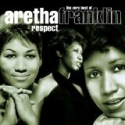
Aretha is indisputably the ‘Queen Of Soul’ and the greatest vocalist of the soul genre! There have been very many fine soul vocalists over the years, and soul buffs will each have their favourite and no doubt many will disagree with my assessment. But there is no-one, male or female, who recorded so consistently with such passion, power, grace and finesse.
From the day she was born, she was steeped in the gospel tradition, daughter of the Reverend C.L. Franklin and friend to such gospel greats as Mahalia Jackson. By 1960 she was already recording with Columbia and although she made a number of albums for the label which were far from poor, they weren’t that successful commercially or artistically. Even John Hammond, the man responsible for signing her, admitted that the predominantly white run label had little relevant experience or ability to fully exploit her undoubted genius.
The work she did for Columbia was competent but hardly the stuff of legends – that body of work came when she joined Atlantic Records and began to work with Jerry Wexler. In January 1967, they recorded ‘I Never Loved A Man’ and ‘Do Right Woman’ in Rick Hall’s Fame studios and the period of classic after classic had begun. Right from the off, Aretha carried on the secularisation of gospel music first pioneered by Ray Charles, also with Atlantic. Wexler himself points out that although he was ostensibly the producer (and certainly should take the credit for marrying up Aretha with the sympathetic musicians that he did) Aretha was the final arbiter and the key contributor to the overall sound she produced. She selected or wrote most of the material on the first album (“I Never Loved A Man“) and in so doing paved the way for the many others who took her lead. Roger Hawkins, the drummer on many of Aretha’s great sides, commented on those very first sessions “I’ve never experienced so much feeling coming out of one human being“

The first four albums for Atlantic produced 10 top ten hits and 6 number one R&B smashes. Much of that success is simply down to the beauty of the music she created and the integrity she displayed in presenting it. Album after album of classic material was produced, starting with the first in 1967, “I Never Loved A Man“, followed by gems such as “Aretha Arrives“, “Lady Soul“, “Aretha Now“, “Spirit In The Dark“, “Young, Gifted And Black” right through to the 1974 session “Let Me In Your Life“, which included the hit ‘Until You Come Back To Me’. This brief overview could easily become an album list – each one should be bought and revered. Throughout this time, not only did she produce a tremendous amount of wonderful original material, she also took other artist’s songs and made them her own. Once she recorded a song, it could never be reclaimed by the original artist – try ‘Respect’ (Otis Redding), ‘Chain Of Fools’ (Don Covay) or ‘I’m In Love’ (Bobby Womack) to see what we mean.
In 1980 she left Atlantic to join Arista and her first release “Aretha” boasted a fine version of the Doobies ‘What A Fool Believes’, proving yet again how she could take a relatively simple pop song and imbue it with a sense of emotion unimagined by listening to the original. In 1985 she released “Who’s Zoomin’ Who” which was produced by Narada Michael Walden and included three hits, the title track, ‘Freeway Of Love’ and ‘Another Night’. Although an extremely commercial outing, it demonstrated she was still at the top of her form. She hadn’t forgotten her gospel roots either and in 1988 she recorded the live gospel album “One Lord, One Faith“, partly as a tribute to her father who had died a year earlier.
Her phrasing and timing are second to none and she manages to bring a sense of integrity to everything she records. Jerry Wexler, commenting on her eclecticism simply said “Her genius transcends all categories“. To those well meaning old soul purists who tend to get a little uptight at the thought of Aretha doing ‘pop songs’ such as ‘Daydreaming’, ‘Young Gifted And Black’ and ‘You’re All I Need To Get By’, perhaps Aretha herself gave the best response way back in 1967:-
“Soul is the ability to make other people feel what you’re feeling. It’s hard to laugh when you want to cry. Some people can’t hide it. I can’t, so when I sing, it doesn’t come across as fake.”
All the Atlantic material is worth your time, consideration and money, but as this is a Primer, you might want to go for one of the compilations or Box Sets on the market. The 2CD “Respect – The Best Of Aretha Franklin” is a fine introduction and should send you scurrying to get hold of the Atlantic albums. If you can find it and run to it (it’s a little pricey in the UK now) “Aretha Franklin, Queen Of Soul – The Atlantic Recordings” on Rhino is a superb four disc retrospective on Aretha’s prolific recordings for the Atlantic label. It has the added benefit of an excellent eighty page booklet and is lovingly put together – it’s the essential soul music purchase!
